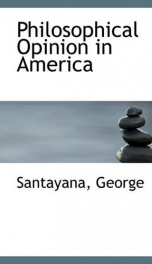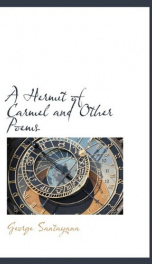Santayana George
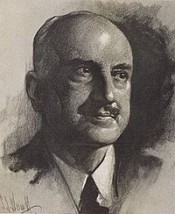
George Santayana (December 16, 1863, Madrid, Spain – September 26, 1952, Rome, Italy), was a philosopher, essayist, poet, and novelist. A lifelong Spanish citizen, Santayana was raised and educated in the United States, wrote in English and is generally considered an American man of letters. Of his nearly 89 years, he spent 39 in the U.S. Santayana is perhaps best known as an aphorist, most famously for his oft-misquoted remark "Those who cannot remember the past are condemned to repeat it,"[1] (sometimes called Santayana's Law of Repetitive Consequences). Similarly, a quote of Santayana's: "Only the dead have seen the end of war."[2] is often falsely attributed to Plato. Born Jorge Agustín Nicolás Ruiz de Santayana y Borrás, 16 December 1863, he spent his early childhood in Ávila, Spain. His mother, Josefina Borrás was the daughter of a Spanish official in the Philippines. He was the only child of his mother's second marriage. She had previously been the widow of George Sturgis, a Boston merchant with whom she had five children, two of whom died in infancy. She lived in Boston following her husband's death in 1857, but in 1861 went with her three surviving children to live in Madrid. There she encountered Agustín Ruiz de Santayana, an old friend from her years in the Philippines, and married him in 1862. Ruiz de Santayana was a colonial civil servant, painter, and minor intellectual. The family lived in Madrid and Ávila until 1869, when Santayana's mother returned to Boston with her three Sturgis children, leaving Jorge, then five, with his father in Spain. Jorge and his father followed her in 1872, but his father, finding neither Boston nor his wife's attitude to his liking, soon returned alone to Ávila, where he remained for the rest of his life. Jorge did not see him again until summer vacations while he was a student at Harvard. Thus from the time he was five, Jorge's parents lived apart. Sometime during this period, Jorge's first name became George, the English equivalent. He attended Boston Latin School and Harvard University, studying under William James and Josiah Royce, whose colleague he subsequently became. After graduating from Harvard, Phi Beta Kappa[3] in 1886, he studied for two years in Berlin, returning to Harvard to write a thesis on Rudolf Hermann Lotze and teach philosophy, thus becoming part of the Golden Age of the Harvard philosophy department. Some of his Harvard students became famous in their own right, including T. S. Eliot, Gertrude Stein, Wallace Stevens, Walter Lippmann, W. E. B. Du Bois, and Harry Austryn Wolfson. From 1896 to 1897, he studied at King's College, Cambridge.[4] In 1912, his careful savings added to a legacy from his mother allowed him to resign his Harvard position and spend the rest of his life in Europe. After some years in Ávila, Paris and Oxford, he began, after 1920, to winter in Rome, eventually living there year-round until his death. During his 40 years in Europe, he wrote 19 books and declined several prestigious academic positions. Many of his visitors and correspondents were Americans, including his assistant and eventual literary executor, Daniel Cory. In later life, Santayana was financially comfortable, in part because his 1935 novel, The Last Puritan, had become an unexpected best-seller. In turn, he financially assisted a number of writers including Bertrand Russell, with whom he was in fundamental disagreement, philosophically and politically. Santayana never married. Santayana's main philosophical work consists of The Sense of Beauty (1896), his first book-length monograph and perhaps the first major work on aesthetics written in the United States; The Life of Reason five volumes, 1905–6), the high point of his Harvard career; Scepticism and Animal Faith (1923); and The Realms of Being (4 vols., 1927–40). Although Santayana was not a pragmatist in the mold of William James, Charles Sanders Peirce, Josiah Royce, or John Dewey, The Life of Reason arguably is the first extended treatment of pragmatism ever penned. Like many of the classical pragmatists, and because he was also well-versed in evolutionary theory, Santayana was committed to a naturalist metaphysics, in which human cognition, cultural practices, and social institutions have evolved so as to harmonize with the conditions present in their environment. Their value may then be adjudged by the extent to which they facilitate human happiness. The alternate title to The Life of Reason, "the Phases of Human Progress", is indicative of this metaphysical stance. Santayana was an early adherent of epiphenomenalism, but also admired the classical materialism of Democritus and Lucretius (of the three authors on whom he wrote in Three Philosophical Poets, Santayana speaks most favorably of Lucretius). He held Spinoza's writings in high regard, without subscribing to the latter's rationalism or pantheism. Although an agnostic, he held a fairly benign view of religion in contrast to thinkers like Bertrand Russell who held that religion was harmful in addition to being false. His views on religion are outlined in his books Reason in Religion, The Idea of Christ in the Gospels, and Interpretations of Poetry and Religion. Santayana described himself as an "aesthetic Catholic", and spent the last decade of his life at the Convent of the Blue Nuns of the Little Company of Mary on the Celian (Caelius) Hill at 6 Via Santo Stefano Rotondo in Rome, cared for by the Irish sisters there. Santayana's one novel, The Last Puritan, is a Bildungsroman, that is, a novel that centers on the personal growth of the protagonist. His Persons and Places is an autobiography. These works also contain many of his tarter opinions and bons mots. He wrote books and essays on a wide range of subjects, including philosophy of a less technical sort, literary criticism, the history of ideas, politics, human nature, morals, the subtle influence of religion on culture and social psychology, all with considerable wit and humor. While his writings on technical philosophy can be difficult, his other writings are far more readable, and all of his books contain quotable passages. He wrote poems and a few plays, and left an ample correspondence, much of it published only since 2000. In his temperament, judgments and prejudices, many of which do not sit well with present-day fashions, Santayana was very much the Castilian Platonist, cold, aristocratic and elitist, a curious blend of Mediterranean conservative (similar to Paul Valéry) and cultivated Anglo-Saxon, aloof and ironically detached. Russell Kirk discussed Santayana in his The Conservative Mind from Edmund Burke to T. S. Eliot. Like Alexis de Tocqueville, Santayana observed American culture and character from a foreigner's point of view. Like Ralph Waldo Emerson, he wrote philosophy in a literary way. Even though he declined to become an American citizen and happily resided in fascist Italy for decades, he is usually considered an American writer by Americans. He himself admitted to being most comfortable, intellectually and aesthetically, at Oxford. His materialistic, skeptical philosophy was never in tune with the Spanish world of his time. In the post-Franco era he is gradually being recognized and translated. Ezra Pound includes Santayana among the many cultural references in The Cantos, notably in Canto LXXXI and Canto XCV. Chuck Jones used Santayana's description of fanaticism as "redoubling your effort after you've forgotten your aim" to describe his cartoons starring Wile E. Coyote and Road Runner.[5] Santayana is remembered in large part for his aphorisms, many of which are so common as to have become clichéd. His philosophy has not fared quite as well; though he is regarded by most as an excellent prose stylist, Professor John Lachs (who is sympathetic with much of Santayana's philosophy) writes in his book 'On Santayana' that the latter's eloquence may ultimately be the cause of this neglect. Nonetheless, Santayana influenced those around him, like Bertrand Russell, who in his critical essay admits that Santayana single-handedly steered him away from the ethics of G.E. Moore. He also influenced many of his prominent students, perhaps most notably the eminent poet Wallace Stevens. And, no doubt, any who study the philosophies of naturalism or materialism in the 20th Century come inevitably to Santayana, whose mark upon them has been great. Santayana is quoted by Canadian-American sociologist Erving Goffman as a central influence in the thesis of his famous 1959 book The Presentation of Self in Everyday Life. The Santayana Edition: The balance of this edition is published by the MIT Press. Other works: Criticism of religion • Exegesis • History of religion • Religion • Religious philosophy • Theology • Relationship between religion and science • Religion and politics • Faith and rationality • more... Afterlife • Euthyphro dilemma • Faith • Intelligent design • Miracle • Problem of evil • Religious belief • Soul • Theodicy • Spirit Acosmism • Agnosticism • Animism • Antireligion • Atheism • Brights • Dharmism • Deism • Divine command theory • Dualism • Esotericism • Exclusivism • Existentialism (Christian, Agnostic, Atheist) • Feminist theology • Gnosticism • Henotheism • Humanism (Religious, Secular, Christian) • Inclusivism • Monism • Monotheism • Mysticism • Naturalism (Metaphysical, Religious, Humanistic) • New Age • Nondualism • Nontheism • Pandeism • Pantheism • Polytheism • Process theology • Religious fundamentalism • Spiritualism • Shamanism • Taoic • Theism • Transcendentalism • more ... Albrecht Ritschl • Alvin Plantinga • Anselm of Canterbury • Antony Flew • Augustine of Hippo • Averroes • Baron d'Holbach • Baruch Spinoza • Blaise Pascal • Boethius • David Hume • Desiderius Erasmus • Emil Brunner • Ernst Cassirer • Ernst Haeckel • Ernst Troeltsch • Friedrich Schleiermacher • Gaunilo of Marmoutiers • Georg Hegel • George Santayana • Harald Høffding • Heraclitus • Immanuel Kant • J. L. Mackie • Johann Gottfried Herder • Karl Barth • Ludwig Feuerbach • Maimonides • Paul Tillich • Pico della Mirandola • Ramakrishna • Reinhold Niebuhr • René Descartes • Richard Swinburne • Robert Merrihew Adams • Rudolf Otto • Sigmund Freud • Søren Kierkegaard • Thomas Aquinas • Thomas Chubb • William Alston • William James • W.K. Clifford • William L. Rowe • William Whewell • William Wollaston • more ...
do you like this author?
What readers are saying
What do you think? Write your own comment on this book!
write a commentWhat readers are saying
What do you think? Write your own comment on this author!
write a commentBook list

Three Philosophical PoetsLucretius,Dante,and Goethe
Series:
Unknown
Year:
Unknown
Raiting:
4.5/5
Show more
add to favoritesadd In favorites

The Sense of BeautyBeing the Outlines of Aesthetic Theory
Series:
Unknown
Year:
Unknown
Raiting:
4/5
Show more
add to favoritesadd In favorites

Winds Of DoctrineStudies in Contemporary Opinion
Series:
Unknown
Year:
Unknown
Raiting:
3/5
Show more
add to favoritesadd In favorites
Book list

Three Philosophical PoetsLucretius,Dante,and Goethe
Series:
Unknown
Year:
Unknown
Raiting:
4.5/5
Show more
add to favoritesadd In favorites

The Sense of BeautyBeing the Outlines of Aesthetic Theory
Series:
Unknown
Year:
Unknown
Raiting:
4/5
Show more
add to favoritesadd In favorites

Winds Of DoctrineStudies in Contemporary Opinion
Series:
Unknown
Year:
Unknown
Raiting:
3/5
Show more
add to favoritesadd In favorites

Some Turns of Thought in Modern PhilosophyFive Essays
Series:
Unknown
Year:
Unknown
Raiting:
3/5
Show more
add to favoritesadd In favorites

The Life of Reason
The Phases of Human Progress
Series:
Unknown
Year:
Unknown
Raiting:
3/5
Show more
add to favoritesadd In favorites
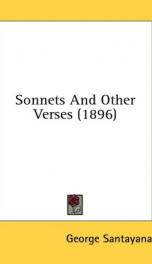
sonnets and other verses
Series:
Unknown
Year:
Unknown
Raiting:
4/5
Many of the earliest books, particularly those dating back to the 1900s and before, are now extremely scarce and increasingly expensive. We are republishing these classic works in affordable, high quality, modern editions, using the original text and artwork. --This text refers to the Paperback edition.
Show more
add to favoritesadd In favorites

soliloquies in england and later soliloquies
Series:
Unknown
Year:
Unknown
Raiting:
4.5/5
The Shelf2Life Literature and Fiction Collection is a unique set of short stories, poems and novels from the late 19th to early 20th centuries. From tales of love, life and heartbreaking loss to humorous stories of ghost encounters, these volumes captivate the imaginations of readers young and old. Included in this collection are a variety of dramatic and spirited poems that contemplate the mysteries of life and celebrate the wild beauty of nature. The Shelf2Life Literature and Fiction Collection provides readers with an opportunity to enjoy and study these iconic literary works, many of which were written during a period of remarkable creativity.
Show more
add to favoritesadd In favorites
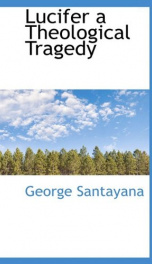
lucifer a theological tragedy
Series:
Unknown
Year:
Unknown
Raiting:
3/5
Many of the earliest books, particularly those dating back to the 1900s and before, are now extremely scarce and increasingly expensive. We are republishing these classic works in affordable, high quality, modern editions, using the original text and artwork. --This text refers to an alternate Paperback edition.
Show more
add to favoritesadd In favorites
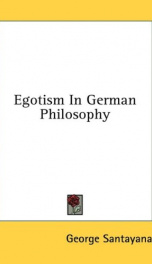
egotism in german philosophy
Series:
Unknown
Year:
Unknown
Raiting:
1.5/5
First written during the darkest days of World War I and then republished with just a new preface at the beginning of World War II, this is an analysis of the basic philosophy underlying the thinking of the German people. Santayana passes from the hints of egoism in Goethe to the "seeds of egotism" in Kant, and from these to the philosophies of Schopenhauer and Nietzsche. This study is basic to any collection in the area of philosophy or history.
Show more
add to favoritesadd In favorites
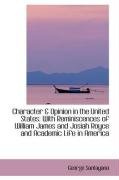
character opinion in the united states with reminiscences of william james an
Series:
Unknown
Year:
Unknown
Raiting:
2.5/5
The book begins with the essay "A Brief History of my Opinions," which is as good an introduction to Santayana's thought. The author combines a sympathetic portrayal of the personalities with a devastating dissection of their specious views. In one of his best essays "The Genteel Tradition at Bay" Santayana especially focuses his critical attention on their moral absolutism, which he demonstrates is self-contradictory and unfeasible. "Call it humanism or not, only a morality frankly relative to man's nature is worthy of man, being at once vital and rational, martial and generous," writes Santayana; "whereas absolutism smells of fustiness as well as of faggots." Santayana's philosophical reflections are not merely brilliant reasoned and beautifully written.
Show more
add to favoritesadd In favorites
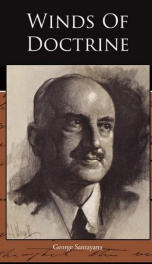
Winds Of Doctrine
Series:
Unknown
Year:
Unknown
Raiting:
4/5
George Santayana was a Spanish philosopher, essayist, poet, and novelist. He was educated in the United States and wrote in English. He is remembered for the quote "Those who cannot remember the past are condemned to repeat it." Santayana was committed to a naturalist metaphysics, in which human cognition, cultural practices, and social institutions have evolved so as to harmonize with the conditions present in their environment. Winds of Doctrine: Studies in Contemporary Opinion was published in 1913. The Table of Contents includes The intellectual temper of the age, Modernism and Christianity, The philosophy of M. Henri Bergson, The philosophy of Mr. Bertrand Russell--, Shelley: or the poetic value of revolutionary principles, and The genteel tradition in American philosophy.
Show more
add to favoritesadd In favorites
What readers are saying
What do you think? Write your own comment on this author!
write a commentif you like Santayana George try:
readers also enjoyed
What readers are saying
What do you think? Write your own comment on this author!
write a commentGenre
if you like Santayana George try:
readers also enjoyed
Do you want to read a book that interests you? It’s EASY!
Create an account and send a request for reading to other users on the Webpage of the book!
